Ghostwriting Legality: Ethics, Ownership, and Writer Credit
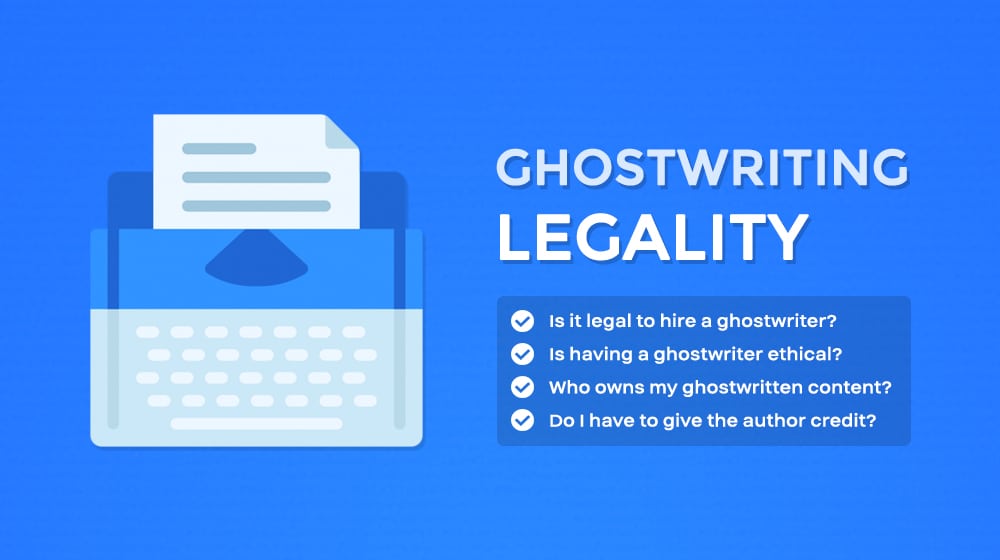
Ghostwriting is not new by any means. Ghosting for creative pursuits has a long and storied history. Even famous people like Mozart spent part of their career ghosting for others. Throughout history, there have always been people who want to get their ideas out there. Some people or brands want to build a reputation for themselves. However, many of these people have neither the time nor the inclination to do that work themselves.
While emphasizing intellectual property rights, copyright, and the threat of lawsuits in modern business, it might seem like ghostwriting is too risky. If you pay a ghostwriter for content and use that content, they still wrote it. Right? What stops them from using it elsewhere or suing you later if they don't like what you're doing with it?
Let's talk about the intricacies of ghostwriting, including the legalities, ethics, and quirks of using a ghostwriter to create content for you.
 30 Second Summary
30 Second Summary
You can legally hire ghostwriters when you have a clear contract that covers payment, rights and ownership of content. Your ghostwriter handles the writing while you provide expertise and direction - this setup is ethical as long as you stay involved in creating the content. You'll get writing expertise, time savings and often marketing help when working with ghostwriters. Though you don't need to credit them, you have to include proper attribution terms in your agreement. The practice works best when you partner with writers to share your knowledge rather than having them create content without your input.
A Quick Answer To Both
Ethics are highly debated in ghostwriting. The general consensus (broadly accepted in various industries, academia, and journalistic fields) is that if the person hiring the ghostwriter still takes some part in the production of the content, it's ethical. If the person hiring the ghostwriter has zero involvement in the creation of the content, and yet the words of another are being published under their name, it crosses into unethical territory.
Legality is more cut and dry. Ghostwriting is legal as long as there is a clear-cut agreement that both the writer and the person paying for the content agree to. If somebody breaks the contract or uses the content without permission, then it becomes a legal issue. Otherwise, it's just somebody paying a writer to write content, and there are no legal issues at all with that.
Now, there is a lot of grey area, historical precedent, and even court cases on this subject. Let's cover this with a bit more nuance.
Is Ghostwriting Legal?
Is ghostwriting legal?
The longer answer has to do with two things: historical precedent and contracts.
Ghosting is a practice that has been happening for centuries. Many such methods end up enshrined in culture as acceptable even if modern sensibilities might find them objectionable in some way.
With ghostwriting, there's some level of ethical concern about passing off the work of others as your own. I'll talk about that more later. That said, ethics are only sometimes codified into law. It's unethical to steal, and theft is criminal. The ethics of ghostwriting? Stay tuned.
The second thing making ghostwriting legal is contract law.
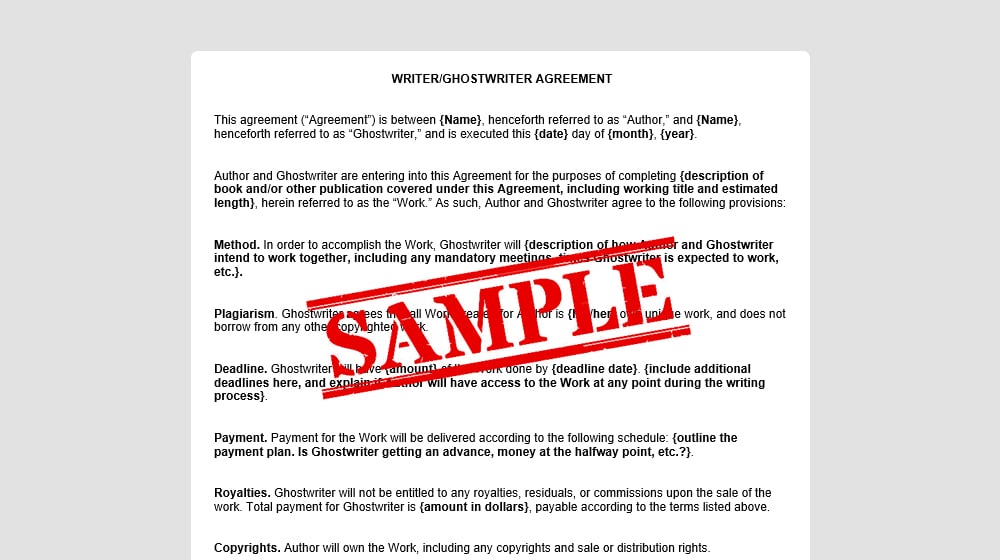
Ghostwriting is even used by attorneys and contract lawyers themselves for the appellate briefs and pleadings of law firms. In a 2007 formal opinion, the ABA (American Bar Association) deemed that legal ghostwriting meets their Model Rules of Professional Conduct / Professional Responsibility, provided they're making the proper disclosures with their legal services. In a separate New York ethics opinion paper, published in 2010, the New York County Law Association agreed with the ABA.
However, court rules haven't been as straightforward with the legal ethics of ghostwriting. Most legal ghostwriting complaints come from the court, opposing counsel, or are revealed in pro se litigant papers. If you're curious about statements from the federal courts, informed consent, court documents, and case law, you might find this article interesting:
The fact is, ghostwriting is legal specifically because it's a willing agreement between two parties:
- The ghostwriter agrees to produce content within the constraints and about the subjects required by the contractor.
- The contractor agrees to compensate the ghostwriter for their work.
There's a bit more to it, though. The contract specifies several details that are relevant to this agreement.
- The compensation. Compensation is most often money but can be other goods or services agreed upon by both parties. In other words, how much do you pay the ghostwriter?
- Plagiarism protection. Many people who pay ghostwriters will pay for plagiarism checking services to guarantee that the ghostwriter is producing original work and not stealing content from elsewhere to sell to you.
- Intellectual property rights. The contract usually is not simply selling the content itself; it's selling the rights to the content. This practice is very commonplace. In some cases, that contract will include a nondisclosure agreement.
- If one side or the other violates the agreement, penalties may be agreed upon ahead of time to avoid litigation.
- Termination agreements. In case one party or the other wants to terminate the deal, who gets what? Are responsibilities ceased, or will duties be finished? And so on.
The key is intellectual property rights. The writer owns the copyright to the content they produce, and when they sell that content to you, you buy the rights to own, use, reproduce, publish, edit, and otherwise do what you want with the content submissions.
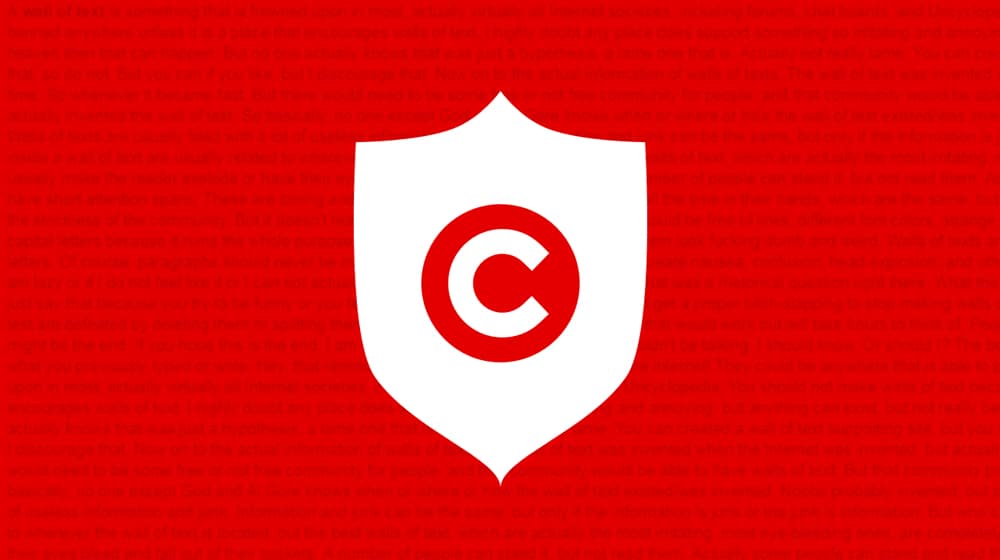
In some cases, the ghostwriter must receive credit or attribution, and in others, they don't. Attribution depends on your agreement with the writer, and I'll talk more about attribution later.
So, ghostwriting is legal because there's a contract making it legal and because it doesn't violate any laws or the rights of others.
Is Ghostwriting Ethical?
Now, you might be wondering, is ghostwriting ethical in the first place?
In many blogging and blog-based ghostwriting cases, the ghostwriter is doing the legwork, but the information and authority come from the person paying them. The contractor might speak their thoughts into a recorder and deliver the transcript to a blog post, eBook, or book. They might perform topic research, write an article brief and outline, and have the ghostwriter flesh that out.
In these cases, the brand owner is an authority; they're just using the ghostwriter to save their own time, to spend it in other ways.
When you hire someone like me, I do my research on your topic, and I have writers who are experts in a wide variety of subjects. We're not going to be performing unique case studies or experiments for your blog, but we know how to separate truth from fiction and create good content based on your expertise.

If you're a complete neophyte to a topic, trying to pass yourself off as an expert and use ghostwriting to do it, there may be a conflict of ethics. If you go to a doctor, you want that doctor to have attended medical school and acquired certification, not paid someone to pass it for them, right? The same goes for a brand leader; you want the person you're trusting with your money to be an actual expert.
There are dozens of websites where people will sell ghostwritten term papers and assignments for students who can't finish their homework.
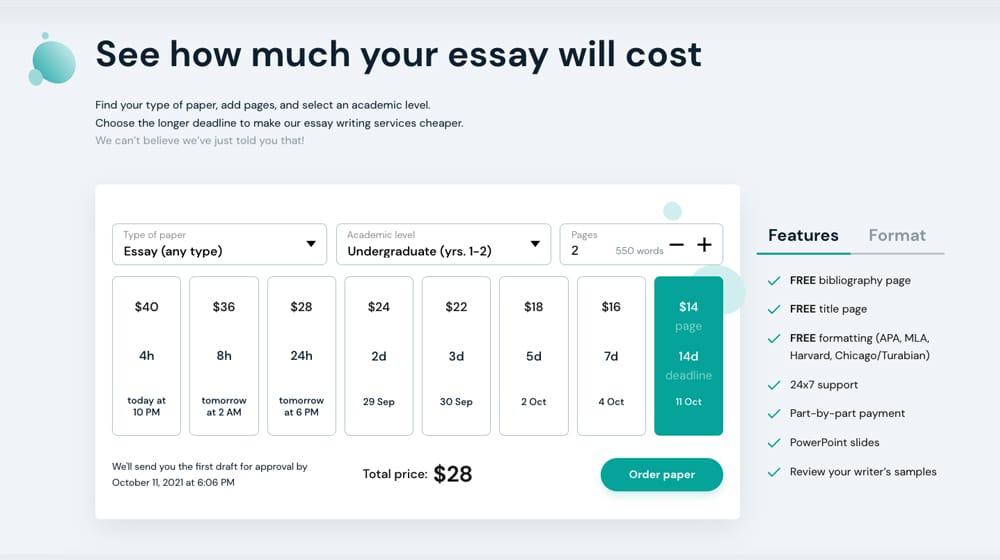
This practice is unethical for two reasons:
- It passes off someone else's work as the student's original thought. The student isn't an expert, and they're using a ghostwriter to replace their learning and effort rather than save themselves time.
- It violates academic honesty policies. While it might not be illegal, it's against the educational institution's policies and thus constitutes academic fraud.
These are just a couple of reasons we choose not to offer academic writing services; we focus on blog posts and business writing.
It all comes down to collaboration. A ghostwriter collaborates with an expert to produce content that conveys the expert's thoughts, views, and opinions in a written format. The expert could do it themselves, but they don't have the time or energy to do so. If you hire a ghostwriter to write a blog with zero direction, zero collaboration, and zero input, that doesn't bode well for you.
Should You Credit Your Writer?
If you're a company looking to hire a ghostwriter for your blog, you might be worried about the writer asking for credit. Should you credit them?
Ghostwriters are well aware that they aren't getting credit for the writing they produce. Part of their contract is that they sell the rights to the content. Once those rights transfer, the company owns the content, and the writer is compensated with money.
The lack of credit is why you can pay a writer less money if you hire them to write publicly for your blog. Public recognition is valuable, and they can work for a lower fee in exchange for that credit, which lets them build up a reputation and work with more people down the road.
Credits aren't worth that much, though, which is why you can't pay writers in free exposure.
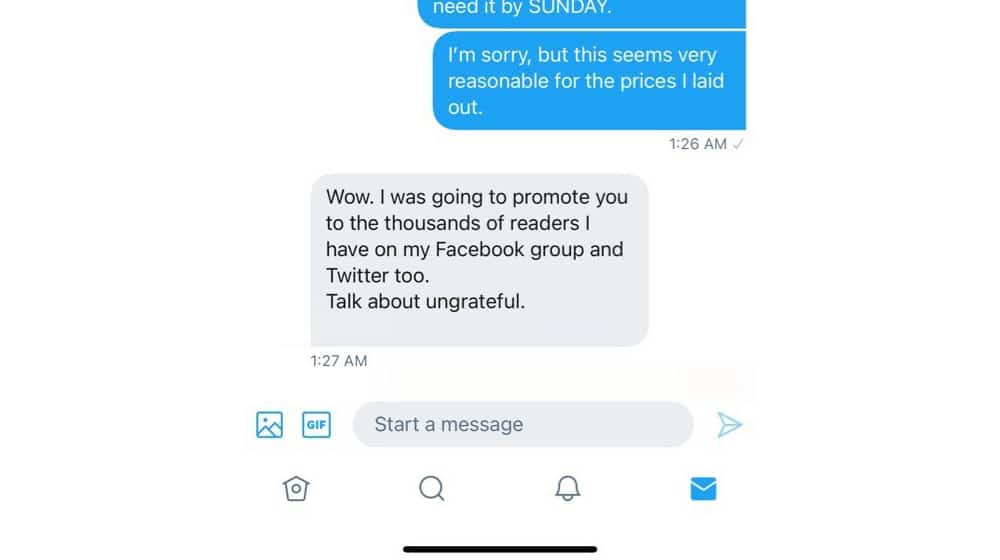
Sometimes, the writer will ask that you act as a reference for them if they need one for a future job. They might also ask that certain pieces they write can be allowed to be used as part of a portfolio, though to be honest, if a writer is good enough to write for your blog, they're good enough to write a second variation on the same topic to use for their purposes. It's very rarely an issue.
Most of the time, you do not need to credit a ghostwriter because the contract you've signed with them gives you the rights and ownership to the content submissions in exchange for money.
There are some cases where the contract may specify more. For example, suppose a ghostwriter writes a fiction novel for an author, and the book is picked up and optioned for a hit TV show. In that case, the ghostwriter might have negotiated to receive some compensation or additional value from that contract. The original agreement might also cover publication rights and not rights for further options. That's a matter for contract law, however, and is largely irrelevant for our discussion.
After all, no one is going to be optioning your blog posts for a movie, no matter how good they are.
What Do You Get When Hiring a Ghostwriter?
If a ghostwriter isn't an expert, and you still have to put time and effort into creating a brief, recording your thoughts, and working with the writer, why would you hire one?
What do you get out of it? Several things.
1. First, you get writing expertise. You might be an expert in health topics, business marketing, or technology, but the writer is not. You probably aren't an expert in technical SEO, written optimizations, technical grammar, or web writing, but the writer is. Together, you can produce well-written content on your topic of expertise; alone, neither of you could.
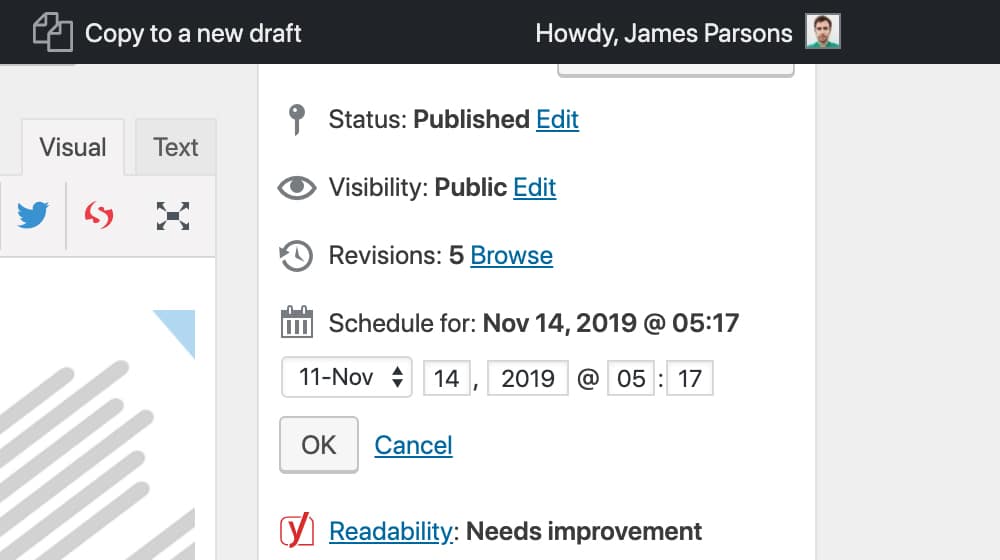
You can think of this as speechwriting. The president has all his speeches written for him, but those speeches reflect his positions and opinions. The president might be less eloquent if left to his own devices, but the speechwriter wouldn't be an authority at all without the ability to work with the president.
3. Second, you get to save time. Writing takes time to write, to edit, to format, to publish. A ghostwriter can handle all of that for you, or at least most of it, saving you time to spend furthering your expertise.

3. Third, you get a partnership. This situation is especially beneficial when your ghostwriters are working through content marketing agencies. When you work with me, you aren't just getting ghostwritten content. You're getting all of my marketing and SEO expertise, my ability to help you pick and choose topics, and my ability to help you figure out what direction to take your content marketing. And, of course, you get content ghostwritten by my team of writers.

All of this is added value you could develop on your own, but why would you? You have more important things to worry about, and when you can pay someone like me to handle it all for you, that's always going to be the better option.
Should You Hire a Ghostwriter?
Whether or not you should hire a ghostwriter is tricky because it all comes down to what you want:
- Do you want someone that you can hand a packet of information to, and can you trust them to turn it into a coherent piece of content within a specific format you desire? If so, a ghostwriter is a good option. You can work with them to answer their questions, refine the content you want to be created, and produce something you can be proud of (with your name attached to it). I wrote a whole guide on how to hire a ghostwriter here.
- Do you want someone who will do all of the legwork for you? You give them a topic, do all of the research, write all of the words, and publish it for you, with no deeper collaboration? A ghostwriter can do this, but it may be unethical depending on the purpose of the content. It would be best if you were careful when doing this, but it's possible to do. I recommend using it for things that aren't flagship or authority content, like product descriptions, website copy, and blog posts.
- Do you want someone to write for your blog, cover all of the bases, and handle content marketing? If you only want to work with one person, you can hire a freelance writer. You might be better off hiring someone you can give credit to and who can bring their audience and authority to your blog to boost your chances of success even higher.
- Do you want someone to manage your entire content marketing scope for you, with collaboration to ensure that the information is accurate, the formatting fits your brand, and the marketing works? Then it would be best if you had a content marketing agency.
Let me tell you; I'm always available for a phone call. Just reach out, and we can discuss what I can do for you.
Did I answer all of your questions on ghostwriting? If not, please share with me in the comments area below! I'd be happy to answer your question and add it to this article as well. Don't be shy!



 30 Second Summary
30 Second Summary



December 08, 2021
Thank you! I hired a writer who wanted his name on my blog posts, and I received some pushback when I wanted these ghostwritten.
It's good to know I'm not alone and this is pretty much the standard in this industry!
December 09, 2021
Hey Dale! You bet.
I think it's the standard for freelance writers and contractors, for sure.
I can see them being a little upset about it with full-time employees, but it depends on whether that was communicated to them or not before their onboarding. Communication is key.
May 02, 2022
Hi James, would you recommend hiring someone with ghostwriting experience compared to those who are new to the concept? I'm afraid the unfamiliar ones might not be too keen on the idea.
May 05, 2022
Hey Sharon!
I don't think it matters much. Most all freelance writers are comfortable and familiar with ghostwriting.
Still, it's a good idea to be upfront with them about the articles being published under somebody else's name.
In all my years of interviewing hundreds of writers, I've only had one writer who was surprised to learn that we wouldn't publish all of his content under his name.
February 03, 2022
I'm quite new to the details of ghostwriting so this was a big help. I was considering hiring one and now I think I am all-set for it.
February 04, 2022
Thanks Alan!
Please keep us in mind if you're looking for a new content writer. I'm happy to help if you need pointing in the right direction.
February 21, 2022
I am Nicole Ross, and I'm curious I have a massive story in the making. However, as I make a discovery, I hear directly speaking to Stephen king, yet I have never met him or contracted with him. I can listen to him through the Illuminati. What I'm asking is, since he never confronted me with signing anything for a contract, how could he possibly be in my house and digging in my life without my permission? How do I go about handling it
March 04, 2022
Hey Nicole! That sounds like a very different kind of ghost writing than the one I was talking about 😉 You might have to contact a professional who is an expert in that sort of thing.
October 04, 2022
This is definitely not the kind of ghostwriting I was expecting to discuss when I read this article. 😅
October 07, 2022
😀